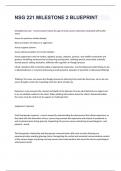NSG 221 MILESTONE 2 BLUEPRINT
Schizophrenia care - correct answer Assess the age of onset, poorer outcomes associated with earlier onset
Assess for previous suicide attempt
Elicit any history of violence or aggression
Assess support systems
Assess client perception of current situation Assess appearance-may be restless, agitated, pacing, catatonic, grimace, may exhibit movements and gestures mimicking someone they're observing (echopraxia), rambling speech, word salad, echolalia, slowed speech, yelling, hesitation, difficulty with cognition or thought process
Mood: Variations (flat or blunted, giddy, inappropriate expression, may feel depressed with feeling no joy
in life(anhedonia), or may feel all knowing and all-powerful, episodes of psychotic or delusional thinking)
Thinking: The nurse can assess the thought process by inferring from what the client says. He or she can assess thought content by evaluating what the client actually say
Delusions: nurse assesses the content and depth of the delusion to know what behaviors to expect and to try to establish reality for the client. When eliciting information about the client's delusional beliefs, the nurse must be careful not to support or challenge them
Judgement: Impaired
Grief therapeutic response - correct answer By understanding the phenomena that clients experience as they deal with the discomfort of loss, nurses may promote the expression and release of emotional as well as physical pain during grieving. Supporting this process means ministering to psychological—and physical—needs
The therapeutic relationship and therapeutic communication skills such as active listening are paramount when assisting grieving clients. Recognizing the verbal and nonverbal communication content
of the various stages of grieving can help nurses select interventions that meet the client's psychological and physical needs. Delirium care - correct answer Delirium is a syndrome that involves disturbed consciousness and changes
in cognition. It is usually caused by an underlying, treatable medical condition such as physiological or metabolic imbalances, infections, nutritional deficits, medication reactions or interactions, drug intoxication, or alcohol withdrawal.
The primary goals of nursing care for clients with delirium are protection from injury, management of confusion, and meeting physiological and psychological needs.
Alzheimers hallucinations - correct answer Alzheimer disease is a progressive brain disorder that has a gradual onset but causes an increasing decline in functioning, including loss of speech, loss of motor function, and profound personality and behavioral changes such as paranoia, delusions, hallucinations, inattention to hygiene, and belligerence. It is evidenced by atrophy of cerebral neurons, senile plaque deposits, and enlargement of the third and fourth ventricles of the brain.
Risk for Alzheimer disease increases with age, and average duration from onset of symptoms to death is 8 to 10 years. Research has identified genetic links to both early- and late-onset Alzheimer disease
Alcohol withdrawal - correct answer Alcohol is a central nervous system depressant
CM:coarse hand tremors, sweating, elevated pulse and blood pressure, insomnia, anxiety, and nausea or vomiting. Severe or untreated withdrawal may progress to transient hallucinations, seizures, or delirium
Symptoms of withdrawal usually begin 4 to 12 hours after cessation
Peas on day 2 and over in about 5 days, however can take 1-2 weeks
Treat:benzodiazepines: lorazepam (Ativan), chlordiazepoxide (Librium), or diazepam (Valium)
CIWA 8-mild
8-15 moderate
>15severe
Methadone - correct answer Methadone is an opioid




